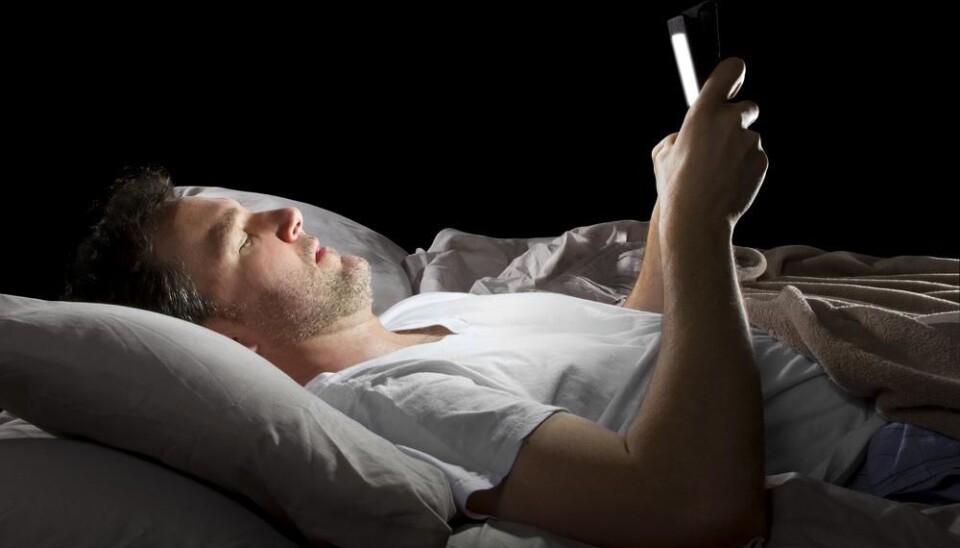
Bringing your computer to bed can wreck your next day at work
A new thesis from Roskilde University shows that reading work-related emails in bed disturbs your work the day after.
Reading work-related emails in bed at night makes you less engaged and creative at work the following day.
That’s the conclusion of a new thesis from Roskilde University, in which two graduate students studied what effect a disrupted night’s sleep had on employees’ ability to be innovative.
The study’s conclusions revealed a scary trend.
“We could see that employees who lay in bed in the evening with laptops and phones answering emails had a much less restful night, often waking up,” says co-author Claes Ziehm Mortensen. “It was obvious that people who had spent their evenings responding to work-related emails in bed were less alert at work the following day. People who tended to take their computer to bed with them also reported not feeling so good and less able to engage in innovative processes.”
Mortensen and fellow graduate student Jakob Bjerrum Koch recently defended their Master’s thesis for which they were given top marks.
Best to follow natural circadian rhythm
According to Mortensen, using a computer and dealing with work-related email at night ruins your following day at work is due to the light emitted by electronic devices -- cheating the brain so that it doesn’t know whether it is night or day.
This makes for poor unrestful sleep and more unperceived wakening.
The following day, employees who answered their mail the previous evening are less alert, they have less energy and have poorer collaborative skills, which affects their creativity and innovative abilities.
On the other hand, employees who follow their natural circadian rhythm get a much better night’s sleep, have more energy at work and are much better able to deliver the innovation companies often rely on to stay ahead.
This has consequences, says Mortensen.
“It means that you have to ask yourself the question: can a company demand that their staff go to bed at a reasonable time? Perhaps companies should even think in terms of it being a good idea for staff not to feel an obligation to deal with email late in the evening because doing so will impact on their work the following day,” he says.
Why taking your laptop to bed is a bad idea
According to sleep researcher at Glostrup Hospital, Birgitte Rahbek Kornum, PhD, it’s a well-known fact that light in bed can disrupt your night’s sleep.
When evening falls the brain begins to produce the substance melatonin, which causes the body to relax, she explains.
The level of melatonin in the brain peaks at around one in the morning and ensures a good night’s sleep.
Artificial light can shift the time at which melatonin is released by the brain so that it peaks far too late in the night.
This means that you get a poorer night’s sleep.
“Blue light in particular can defer the brain’s production of melatonin. For this reason the brain does not start producing melatonin until the computer has been switched off. From the point of view of a sleep researcher it’s a very bad idea to watch TV or use a computer or iPad just before you go to sleep,” says Kornum.
Artificial light confuses the brain
Light does not just affect the way we sleep.
Light has a decisive influence around the clock, something that was demonstrated in the second focus area of the thesis.
Here, the two students examined which lighting the test individuals worked under.
The study showed that employees with the poorest lighting described their working day in less positive terms and said they had less energy.
“Our brains register the light around us and tell us whether it’s day or night. Only natural light causes the brain to believe that it’s day, and this releases certain substances in the brain that make us more creative through energy and a feeling of pleasure. If the light doesn’t feel natural the brain thinks it’s night and instead, we sit there yawning and feeling off our game,” says Ziehm Mortensen.
Get that computer out of your bedroom
Mortensen recommends that both companies and employees give thought to how sleep and light affect them.
He points to the advantage of having outdoor meetings.
“If two or three people are to hold a meeting it might be a good idea to do so while taking a walk, which means they will get some natural light. It doesn’t take more than 12-20 minutes of sunlight to put you in a better mood and give you more energy,” says Ziehm Mortensen.
Kornum agrees.
“Light is particularly important early in the day. A nice burst of sunlight in the early morning can help to synchronise the brain’s melatonin level with your circadian rhythm. Which is what makes it such an excellent idea,” the sleep researcher explains.
Ziehm Mortensen also points out that it can also be beneficial to companies to tell less staff not to reply to emails too close to midnight.
“You’re better off getting up early,” says Ziehm Mortensen.
------------------
Read the original story in Danish on Videnskab.dk
Translated by: Hugh Matthews









